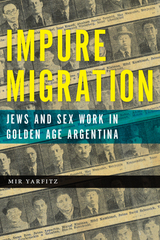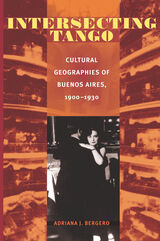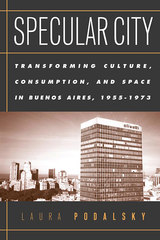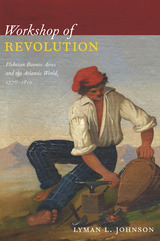6 books about Buenos Aires (Argentina)

Buenos Aires
400 Years
Edited by Stanley R. Ross and Thomas F. McGann
University of Texas Press, 1982
Buenos Aires has been called the Paris of Latin America, and the comparison is just, for in style of life and city design Buenos Aires resembles not only the City of Light but also the other great world capitals—London, Rome, New York. Buenos Aires: 400 Years attests to the long, diverse, and fascinating life of this urban mass of some six hundred square miles and eleven million inhabitants, which began as a tiny palisaded outpost on the remote fringe of the Spanish Empire. That colonial past is skillfully described here, but so too is the future of Buenos Aires. Each essay reveals much about the sociological and economic life of the city and the dynamic history of its people. This informative volume derives from a conference held at the Library of Congress in September 1980, which was dedicated to the 400th anniversary of the founding of Buenos Aires. The conference was jointly sponsored by the University of Texas at Austin and the Municipality of Buenos Aires.
[more]

Impure Migration
Jews and Sex Work in Golden Age Argentina
Mir Yarfitz
Rutgers University Press, 2019
Impure Migration investigates the period from the 1890s until the 1930s, when prostitution was a legal institution in Argentina and the international community knew its capital city Buenos Aires as the center of the sex industry. At the same time, pogroms and anti-Semitic discrimination left thousands of Eastern European Jewish people displaced, without the resources required to immigrate. For many Jewish women, participation in prostitution was one of very few ways they could escape the limited options in their home countries, and Jewish men facilitate their transit and the organization of their work and social lives. Instead of marginalizing this story or reading it as a degrading chapter in Latin American Jewish history, Impure Migration interrogates a complicated social landscape to reveal that sex work is in fact a critical part of the histories of migration, labor, race, and sexuality.
[more]

Intersecting Tango
Cultural Geographies of Buenos Aires, 1900-1930
Adriana J. Bergero
University of Pittsburgh Press, 2008
In the early part of the twentieth century, Buenos Aires erupted from its colonial past as a city in its own right, expressing a unique and vibrant cultural identity.
Intersecting Tango engages the city at this key moment, exploring the sweeping changes of 1900-1930 to capture this culture in motion through which Buenos Aires transformed itself into a modern, cosmopolitan city.
Taking the reader through a dazzling array of sites, sources, and events, Bergero conveys the city in all its complexity. Drawing on architecture and gendered spaces, photography, newspaper columns, schoolbooks, “high” and “low” literature, private letters, advertising, fashion, and popular music, she illuminates a range of urban social geographies inhabited by the city's defining classes and groups. In mining this vast material, Bergero traces the profound change in social fabric by which these diverse identities evolved, through the processes of modernization and its many dislocations, into a new national identity capable of embodying modernity.
In her interdisciplinary study of urban development and cultural encounters with modernity, Bergero leads the reader through the city's emergence, collecting her investigations around the many economic, social, and gender issues remarkably conveyed by the tango, the defining icon of Buenos Aires. Multifaceted and original, Intersecting Tango is as rich and captivating as the dance itself.
Intersecting Tango engages the city at this key moment, exploring the sweeping changes of 1900-1930 to capture this culture in motion through which Buenos Aires transformed itself into a modern, cosmopolitan city.
Taking the reader through a dazzling array of sites, sources, and events, Bergero conveys the city in all its complexity. Drawing on architecture and gendered spaces, photography, newspaper columns, schoolbooks, “high” and “low” literature, private letters, advertising, fashion, and popular music, she illuminates a range of urban social geographies inhabited by the city's defining classes and groups. In mining this vast material, Bergero traces the profound change in social fabric by which these diverse identities evolved, through the processes of modernization and its many dislocations, into a new national identity capable of embodying modernity.
In her interdisciplinary study of urban development and cultural encounters with modernity, Bergero leads the reader through the city's emergence, collecting her investigations around the many economic, social, and gender issues remarkably conveyed by the tango, the defining icon of Buenos Aires. Multifaceted and original, Intersecting Tango is as rich and captivating as the dance itself.
[more]

Memories of Buenos Aires
Signs of State Terrorism in Argentina
Max Memoria Abierta
University of Massachusetts Press, 2013
In the 1970s, Argentina was the leader in the "Dirty War," a violent campaign by authoritarian South American regimes to repress left-wing groups and any others who were deemed subversive. Over the course of a decade, Argentina's military rulers tortured and murdered upwards of 30,000 citizens. Even today, after thirty years of democratic rule, the horror of that time continues to roil Argentine society.
Argentina has also been in the vanguard in determining how to preserve sites of torture, how to remember the "disappeared," and how to reflect on the causes of the Dirty War. Across the capital city of Buenos Aires are hundreds of grassroots memorials to the victims, documenting the scope of the state's reign of terror. Although many books have been written about this era in Argentina's history, the original Spanish-language edition of Memories of Buenos Aires was the first to identify and interpret all of these sites. It was published by the human rights organization Memoria Abierta, which used interviews with survivors to help unearth that painful history.
This translation brings this important work to an English-speaking audience, offering a comprehensive guidebook to clandestine sites of horror as well as innovative sites of memory. The book divides the 48 districts of the city into 9 sectors, and then proceeds neighborhood-by-neighborhood to offer descriptions of 202 known "sites of state terrorism" and 38 additional places where people were illegally detained, tortured, and killed by the government.
Argentina has also been in the vanguard in determining how to preserve sites of torture, how to remember the "disappeared," and how to reflect on the causes of the Dirty War. Across the capital city of Buenos Aires are hundreds of grassroots memorials to the victims, documenting the scope of the state's reign of terror. Although many books have been written about this era in Argentina's history, the original Spanish-language edition of Memories of Buenos Aires was the first to identify and interpret all of these sites. It was published by the human rights organization Memoria Abierta, which used interviews with survivors to help unearth that painful history.
This translation brings this important work to an English-speaking audience, offering a comprehensive guidebook to clandestine sites of horror as well as innovative sites of memory. The book divides the 48 districts of the city into 9 sectors, and then proceeds neighborhood-by-neighborhood to offer descriptions of 202 known "sites of state terrorism" and 38 additional places where people were illegally detained, tortured, and killed by the government.
[more]

Specular City
The Transformation Of Culture, Consumption
Laura Podalsky
Temple University Press, 2004
A sweeping account of one of the cultural centers of Latin America, Specular City tells the history of Buenos Aires during the interregnum after Juan Perón's fall from power and before his restoration. During those two decades, the city experienced a rapid metamorphosis at the behest of its middle class citizens, who were eager to cast off the working-class imprint left by the Perónists. Laura Podalsky discusses the ways in which the proliferation of skyscrapers, the emergence of car culture, and the diffusion of an emerging revolution in the arts helped transform Buenos Aires, and, in so doing, redefine Argentine collective history.More than a cultural and material history of this city, this book also presents Buenos Aires as a crucible for urban life. Examining its structures through films, literatures, new magazines, advertising and architecture, Specular City reveals the prominent place of Buenos Aires in the massive changes that Latin America underwent for a new, modern definition of itself.
[more]

Workshop of Revolution
Plebeian Buenos Aires and the Atlantic World, 1776–1810
Lyman L. Johnson
Duke University Press, 2011
The plebeians of Buenos Aires were crucial to the success of the revolutionary junta of May 1810, widely considered the start of the Argentine war of independence. Workshop of Revolution is a historical account of the economic and political forces that propelled the artisans, free laborers, and slaves of Buenos Aires into the struggle for independence. Drawing on extensive archival research in Argentina and Spain, Lyman L. Johnson portrays the daily lives of Buenos Aires plebeians in unprecedented detail. In so doing, he demonstrates that the world of Spanish colonial plebeians can be recovered in reliable and illuminating ways. Johnson analyzes the demographic and social contexts of plebeian political formation and action, considering race, ethnicity, and urban population growth, as well as the realms of work and leisure. During the two decades prior to 1810, Buenos Aires came to be thoroughly integrated into Atlantic commerce. Increased flows of immigrants from Spain and slaves from Africa and Brazil led to a decline in real wages and the collapse of traditional guilds. Laborers and artisans joined militias that defended the city against British invasions in 1806 and 1807, and they defeated a Spanish loyalist coup attempt in 1809. A gravely weakened Spanish colonial administration and a militarized urban population led inexorably to the events of 1810 and a political transformation of unforeseen scale and consequence.
[more]
READERS
Browse our collection.
PUBLISHERS
See BiblioVault's publisher services.
STUDENT SERVICES
Files for college accessibility offices.
UChicago Accessibility Resources
home | accessibility | search | about | contact us
BiblioVault ® 2001 - 2024
The University of Chicago Press









